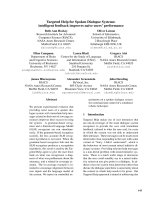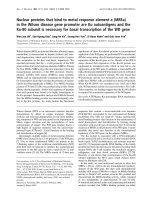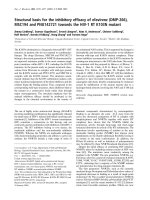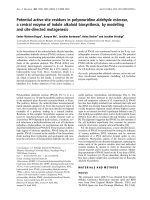Báo cáo y học: " Seeking help for depression from family and friends: A qualitative analysis of perceived advantages and disadvantages" pps
Bạn đang xem bản rút gọn của tài liệu. Xem và tải ngay bản đầy đủ của tài liệu tại đây (215.54 KB, 35 trang )
This Provisional PDF corresponds to the article as it appeared upon acceptance. Fully formatted
PDF and full text (HTML) versions will be made available soon.
Seeking help for depression from family and friends: A qualitative analysis of
perceived advantages and disadvantages
BMC Psychiatry 2011, 11:196 doi:10.1186/1471-244X-11-196
Kathleen M Griffiths ()
Dimity A Crisp ()
Lisa Barney ()
Russell Reid ()
ISSN 1471-244X
Article type Research article
Submission date 15 October 2010
Acceptance date 15 December 2011
Publication date 15 December 2011
Article URL />Like all articles in BMC journals, this peer-reviewed article was published immediately upon
acceptance. It can be downloaded, printed and distributed freely for any purposes (see copyright
notice below).
Articles in BMC journals are listed in PubMed and archived at PubMed Central.
For information about publishing your research in BMC journals or any BioMed Central journal, go to
/>BMC Psychiatry
© 2011 Griffiths et al. ; licensee BioMed Central Ltd.
This is an open access article distributed under the terms of the Creative Commons Attribution License ( />which permits unrestricted use, distribution, and reproduction in any medium, provided the original work is properly cited.
- 1 -
Seeking help for depression from family and friends:
A qualitative analysis of perceived advantages and
disadvantages
Kathleen M Griffiths
§1
, Dimity A Crisp
1
, Lisa Barney
1
,
Russell Reid
2
1
Centre for Mental Health Research, The Australian National University, Acton,
Canberra, ACT, Australia, 0200.
2
Directorate of Mental Health, Department of Defence, CP2-7-043A, Canberra, ACT,
Australia, 0200.
§
Corresponding author
Email addresses:
KMG:
DC:
LB:
RR:
- 2 -
Abstract
Background
People with depression often seek help from family and friends and public health
campaigns frequently encourage such help seeking behaviours. However, there has
been little systematically collected empirical data concerning the effects of such
informal help seeking. The current study sought to investigate the views of
consumers about the advantages and disadvantages of seeking support from family
and friends for depression.
Methods
Participants were the subset of 417 respondents to a survey, sent to 7000 randomly
selected members of an Australian electoral community, who indicated that they had
sought help for depression from family or friends. One item on the survey asked
participants to indicate the advantages or disadvantages of seeking help from family
or friends. A coding system was developed based on a content analysis of the
responses to the item. Each of the responses was then coded by two raters.
Results
Respondents identified both advantages and disadvantages of seeking support from
friends. The most commonly cited advantage was social support (n=282) including
emotional support (n=154), informational support (n=93), companionship support
(n=36) and instrumental support (n=23). Other advantages related to family’s or
friend’s background knowledge of the person and their circumstances (n=72), the
opportunity to offload the burden associated with depression (n=72), the personal
attributes of family and friends (n=49), their accessibility (n=36), and the opportunity
to educate family and friends and increase their awareness about the respondent’s
depression (n=30). The most commonly cited disadvantages were stigma (n=53),
- 3 -
inappropriate support (n=45), the family member’s lack of knowledge, training and
expertise (n=32) and the adverse impact of the help seeking on the family/friend
(n=20) and the relationship (n=18).
Conclusions
Family and friends are well placed to provide support which consumers perceive to be
positive and which can assist them in obtaining formal mental health treatment.
However, the input of some family members may be unhelpful or toxic. There may
be benefits in undertaking community education and destigmatisation programs which
target carers.
- 4 -
Background
Members of the public frequently perceive sources of informal help (e.g., family and
friends) as useful for dealing with depression [1-5]. Indeed, some studies have
reported that the public prefers such help ahead of support from formal sources [1, 2]
and particularly formal mental health sources [6]. Moreover, there is some evidence
that perceived positive support from friends and family members or other informal
sources is associated with improved recovery among consumers with a depressive
disorder [7, 8]. It is perhaps not surprising then that help seeking from family and
friends is often encouraged in mental health promotion campaigns.
However, some researchers have expressed the concern that informal help seeking
may be unhelpful or harmful [5, 9, 10]. For example, Rickwood [9] hypothesised that
the mental health problems of adolescents may be amplified if it results in mutual
disclosure, unhelpful interpretations and rumination. Christensen et al. [10] found that
an internet psycho-educational intervention which was effective in reducing
depressive symptoms did not increase evidence-based help seeking but was associated
with a reduction relative to a control group in seeking help from family and friends.
They suggested that these informal sources of help may be “unhelpful, even toxic
under certain circumstances” and that “the website may have served to reduce
inappropriate help seeking actions” (p.7).
However, there has been little systematically collected empirical data concerning the
effects of seeking help for depression from family or friends. Vollmann and his
collaborators have recently studied the anticipated helpfulness for depression of
several different types of social support from a friend [11]. People with depression
considered that emotional support would be most helpful, followed by instrumental
(tangible) support and informational support. Further, participants with depression
- 5 -
anticipated that protection oriented support (shielding the person with depression from
unwanted input) would be more helpful than activation support (facilitating
activities). However, the Vollmann et al. study did not evaluate actual (as opposed to
anticipated) experiences of support. Nor did they investigate the disadvantages of
seeking support from friends or family which as noted above may yield negative
mental health outcomes. Furthermore, the study only investigated a restricted and
pre-specified range of support behaviours. These behaviours were not formulated
from the self-reported experiences of consumers. In addition, participants were
recruited from a psychiatry centre and a depression self help group and therefore the
views of these consumers may not be representative of those in the general
community, a substantial percentage of whom do not seek professional help [12].
Finally, the Vollmann et al. study was restricted to consumer perceptions of help
seeking from friends.
To the best of our knowledge, there have been no studies of consumer experiences of
informal help seeking based on categories derived from consumer reports. Nor has
any study investigated the disadvantages of such help seeking, consumer experiences
of actual as opposed to anticipated help seeking or consumer experiences of help
seeking from family members. Accordingly, the current study sought to elicit and
undertake a qualitative analysis of the views of a large community-based sample of
consumers about the advantages and disadvantages of seeking help from informal
sources, specifically support sought from family and friends.
Methods
Measures
This study was part of a larger project in which participants completed a ‘Beliefs
about Depression and Help Seeking Questionnaire’. This self-report survey
- 6 -
comprised measures of demographic status, personal and perceived stigma, help-
seeking intention and behaviours, self reported depressive symptoms (PRIME MD)
and previous personal experience of depression (see [13]). In addition, respondents
with a past history of depression were asked to respond to the open-ended question:
“If you sought support from friends and or/family, what would you say were the
advantages and/or disadvantages of doing this?” The current paper is concerned
with responses to this open ended item. Ethics approval was obtained for the study
from the Australian National University Committee for Ethics in Human Research.
Participants
Seven thousand residents, randomly selected from the electoral roll for a New South
Wales electorate in Australia were sent the questionnaire by post. Registration on an
electoral roll is compulsory in Australia. Of the 1312 respondents who completed the
questionnaire, 722 (55%) reported having personally experienced depression. Of
these, 57.8% (n=417) had both sought help from informal sources and provided a
response to the open-ended question which is the focus of this paper. The age of the
latter respondents ranged from 18 to 84 years (mean=48.6, SD=14.2), 22.1% (n=92)
held a Bachelor’s degree or higher educational qualification and 69.3% (n=289) were
women, the latter being consistent with the gender distribution of depression in the
general population [14].
Analyses
The 417 open-ended responses were subjected to a qualitative content analysis.
Initially, two raters (KG and DC) independently read and categorised response into
categories and subcategories under the general headings of ‘Advantages’ and
‘Disadvantages’ of seeking support from friends or family. The two raters then met,
and following discussion agreed on a final coding system. Each participant response
- 7 -
was then coded independently using NVivo8 qualitative data analysis software [15]
by two raters (DC, RR), one of whom (RR) had not been involved in the development
of the coding system. Discrepancies were subsequently resolved by discussion
between the two raters. The responses of each individual could be allocated to more
than one category or subcategory. In addition, following the content analysis, two
raters (KG and RR) independently coded each response as describing either
‘advantages only’, ‘disadvantages only’ or both ‘advantages and disadvantages’ of
consulting a family or friend. Again, any discrepancies were resolved by discussion
between the raters.
Results
Of the 417 participants in this study, 240 (51.3%) cited only advantages of consulting
a family or friend, 25 (6%) reported disadvantages only and 138 (33.1%) described
both disadvantages and advantages. Thus 84.4% of respondents reported at least one
advantage of informal help seeking and 39.1% reported at least one disadvantage.
Fourteen responses (3.4%) could not be coded unambiguously into any of these
categories. Ten of the participants qualified their responses, indicating that the
answer depended on the context or the person involved. The reported advantages,
followed by the reported disadvantages of consulting family and friends about
depression are described below.
Advantages
As shown in Table 1, six main categories emerged with respect to the reported
advantages of seeking help from family and friends for depression. These were, in
order of frequency of comments: (i) the social support they provided (n=282); (ii)
their background knowledge (n=72); (iii) the opportunity to offload the burden
associated with depression (n=72); (iv) their personal attributes (n=49); (v) their
- 8 -
accessibility (n=36); and (vi) the opportunity to educate family and friends and
increase their awareness of the respondent’s depression (n=30). Each main category
comprised a number of subcategories. Some subcategories were further coded into
different types of advantage; these are referred to in italics below.
(i) Category 1 – Social support
The most commonly cited advantage of talking to family and friends was ‘support’.
Some respondents mentioned support only in a general sense without specifying its
precise nature (e.g., “My husband was very supportive”). However, most respondents
described this support more specifically. The most frequently cited form of support
was emotional, followed by informational, companionship, and instrumental support
(see Table 1).
Emotional support. Several types of emotional support were valued by consumers.
The most commonly cited of these was the emotional understanding that family and
friends provided. Related to this, but less commonly cited were the empathic support,
sympathy, and compassion that informal sources provided. Such help was sometimes
seen as distinctly characteristic of informal sources as illustrated by a respondent who
commented: “Generally family is most caring and compassionate”. Similarly,
acceptance was cited by some respondents as a helpful attribute of family and friends.
One participant noted: “Friends were a huge support to me which is what I needed in
order to talk out what was going on inside of me as I worked to help myself; it was
their acceptance of me as a person that was most appreciated and affirming”.
Love and a demonstration of caring were other commonly reported forms of
emotional support provided by family and friends. Respondents cited feelings of
‘renewed love’, ‘unconditional love’, and a realisation of how much people loved and
cared about them. One respondent commented: “My family and close friends really
- 9 -
helped me a lot. I found it much easier to cope when I knew that I had a support
network around me that cared for me”. Similarly, kindness of family or close friends
and intimacy or closeness associated with the relationship were reported to be an
advantage of seeking informal support.
Privacy and confidentiality as well as trust were cited as important advantages of
seeking support from family or friends. In some cases these factors determined which
friend or family members a participant was willing to approach for support. For
example, one participant remarked: “The only person I sought help from was my
husband as I knew he would not tell everyone he met”. Another commented: “The
need to feel complete trust is essential”.
The fact that support was provided by a familiar person was also seen as an
advantage. For example, one respondent noted: “It was confidential and familiar and
not cold and clinical as I would imagine the professionals are”. Involving family also
invoked a sense of safety or protection in some respondents. For example, various
respondents reported that it was ‘secure and safe’ to be ‘exposed’ to family and
friends, that they would protect them “from stressful social situations” and that they
can “watch out for you”. In addition, some participants appreciated being treated
patiently and a number reported that their family offered them encouragement and
reassurance throughout their experience. As one respondent noted: “I found that they
understood what I was going through and encouraged me to … do something to help
myself by taking time out for my own interests”. Another noted: “The advantage was
the reassurance I received and knowing I could get help and that depression was
brought on by circumstances beyond my control/and that someone cared and
understood my position”. The comfort provided by family and friends was another
reported advantage of seeking informal support.
- 10 -
Informal support was also reported to improve self-esteem. For example, one
respondent stated that talking to family and friends “made me feel good about myself”
and another that it helped to “overcome feelings of loneliness, inadequacy, of being
the only one unable to cope”. Some respondents considered that the support they
received was empowering and that it engendered hope with one individual explaining
that “constant reminders” of them being “close by, loving, and knowing who you
were ‘before’. . . really helped me to know one day I would feel happy again to be
alive”.
Some respondents mentioned the role of seeking support in maintaining and
strengthening positive relationships. Finally, in some cases prayer was mentioned as
an advantage of seeking help from family and friends.
Informational support. The most common form of informational support was
provided in the form of advice. One respondent commented: “The main advantage of
talking to family and friends is that one can discuss your problems with others and get
their opinions about your problems and how to solve your problems”. Respondents
valued the ‘practical’ or ‘real life’ aspects of the advice they received from family and
friends. Some respondents particularly valued advice offered by someone with
personal experience with depression, citing the importance of being able to mutually
share experiences with a friend or family member and to receive guidance to find
suitable help.
Indeed a commonly reported form of informal informational support involved
facilitating help seeking from a formal source. Many described the process in terms
suggestive of gentle encouragement and guidance. For example, one respondent
commented that “a close friend was so helpful and guided me to my GP from there I
started to regain my health”. However, others used terms suggestive of a less subtle
- 11 -
process in which the family member or friend more forcefully directed the help
seeking process or even assumed the decision making role. For example, one
respondent stated that “Family convince you to seek help!!” and another that: “My
wife was able to make the decision for me to go see a GP I could not have done
this as I did not understand what was wrong with me. Had nothing been done I would
probably have attempted to harm myself”.
Family and friends also provided feedback that assisted the person in evaluating their
current situation (appraisal support). For example, one respondent commented that
the advantage of seeking help from family and friends “is getting their perspective of
the whole problem, making comparisons”. Respondents often referred to discussions
with family or friends as enabling them to see their life from ‘a different perspective’
and as enabling them to ‘refocus’, ‘to see things more clearly’; or to ‘provide some
grounding/reality check’. Some respondents indicated that this assisted them to
perceive their situation ‘more positively’. Conversely, a number of respondents
reported that family or friends were able to assist them to recognise that they were
depressed and that they needed professional help. For example, one respondent stated:
“A close friend or family member would notice my changes in behaviour/thinking and
advise me to seek professional help”.
Companionship support. The next most frequently cited social support sub-
category was companionship. The most commonly reported type of companionship
support related to satisfying a need for connection. As one respondent noted: “I didn't
feel alone once I had told them how I was feeling”. A small number of people also
cited humour as an advantage of seeking informal support.
Instrumental support and willingness to take positive action. Respondents
mentioned specific practical support as an advantage of seeking help from family and
- 12 -
friends. As noted by one respondent, family and friends “can provide you physical
support to survive day to day”. Within this subcategory a number of respondents
mentioned the importance of others supporting them by caring for their children
and/or undertaking their share of household duties. Other respondents referred in
general terms to a willingness by family and friends to take positive action or to help
‘in practical ways’.
Universality. Respondents reported advantages in speaking to a family member or
friend who had themselves experienced depression. For example, one respondent
referred to helpfulness of “finding out that many people also shared experiences with
PND and I was almost in the majority and not the minority!!”, and another its
helpfulness “to overcome feelings of loneliness, inadequacy, of being the only one
unable to cope”.
(ii) Category 2 - Background knowledge
Many respondents cited that an advantage of seeking informal support was that family
and friends already had important background knowledge about them. Two
subcategories emerged. The first was that family and friends knew the respondent
individually; the second was that they were aware of the respondent’s personal
circumstances.
Knowledge of the person. The fact that family/friends knew the person well was
seen as providing helpful insights into the respondent and what might help them. For
example, one respondent commented that friends and family: “know you on a more
intimate basis and thus have some common grounding or basis on which they know
what makes you tick and something of your beliefs, ideals and tribulation” and
another wrote that “them knowing you and your situation intimately gives them
further insight into solving your problems”. In some cases this knowledge was seen as
- 13 -
providing “insights … that a professional could not know”. In particular, knowing the
person before they became depressed was cited as important by a number of
respondents. As one respondent wrote: “They can carry a sense of the ‘you’ you have
lost for the time being”. This placed family members/friends in a position to
recognise the problem and to understand its true severity and impact.
Awareness of circumstances. A number of respondents believed that it was an
advantage that family and friends were familiar with the respondent’s circumstances
and the potential causes of their depression. It was thought that this knowledge helped
the family member to better understand the respondent’s problem. This was seen as an
advantage because it relieved the respondent from the necessity of explaining the
situation: “They knew the circumstances, personal history and background so there
was less information to convey to them”. It was also seen as placing the family
member or friend in a better position to assist the respondent to cope with the
precipitating circumstances: “They understood what caused me to be depressed in the
first place and helped me to cope with the situation around me at the time”.
(iii) Category 3 - Offloading burden
Many participants reported that it was an advantage to offload their burden by talking
to family and friends. As one respondent wrote, it is “always helpful to talk about a
problem. Things sometimes don't seem so bad when you talk about them”. This
process was described in various ways such as bringing ‘feelings out in the open’,
‘getting things off my chest’, ‘offloading excess baggage’, ‘talking things out’,
‘giving a voice to it’, and ‘being able to share the burden’. Simply talking about the
problem was often described as providing some relief: “It is important to speak to
others because it feels like a heavy weight has been lifted”. In other cases talking
about the problem led to assistance. As one respondent explained: “Talking out
- 14 -
problems helped and family and friends tend to help when they know a problem
exists. If they don't know they can’t help”.
(iv) Category 4 - Personal attributes of the friend or family member
The personal attributes of the source of informal support emerged as a further
important perceived advantage of seeking help from friends and family members.
Trustworthiness was seen as a key attribute of family and friends by a number of
participants, one of whom explained: “You know you have their trust and can be quite
candid about your problems. They are interested in your well being. You are part of
a ‘group’ with which you are familiar and trusting”.
Some participants emphasised that they valued their relatives’ or friends’ honesty and
some that their friends and family members were non-judgmental. Other participants
appreciated the fact that their family and friends were sincerely interested in their well
being and best interests and that they were genuinely caring “enough to be there
(without being paid!)”. Another valued characteristic was that they were loving.
Finally, a small number of participants described the family member or friend as a
good listener or patient. One respondent reported: “They don't mind how long it
takes e.g. months years - they are always going to give supportive time”.
(v) Category 5 – Accessibility and acceptability of help
The accessibility of family and friends was seen as an advantage by many
participants. In contrast to professionals, family and friends were perceived as
approachable, available whenever they were needed ‘day or night’, without time
restriction, and at no cost. Other advantages were that it was possible to discuss
problems honestly and openly with family and friends, being able as one respondent
put it to “expose dark feelings to the light”. Some respondents also felt less
embarrassed and less shame when seeking help from family or friends. For example
- 15 -
one respondent reported that they were better able to accept “the feelings of
inadequacy and vulnerability” than if they had “consulted others outside of my
immediate family unit”. Some participants reported that they were more comfortable
talking to family and friends, noting that it was possible to be yourself and that the
help was more warm and personal.
(vi) Category 6 - Education of the friend or family member (n=30).
A substantial minority of participants indicated that an advantage of speaking to
family and friends was that it increased the latter’s level of understanding of the
problem, and provided an explanation for the participants’ altered behaviour. This
was often seen as helpful for the family member themselves. As one respondent
noted: “They knew that I was going through a bad time and not to take things
personally”. However, in some cases this increased understanding was seen as a
benefit to the person with depression. For example, some participants identified that it
led to increased tolerance by the family member, allowing them “to understand what
is happening to you, rather than criticise you for the differences you portray due to the
depression”. Others reported that informing close-others of the problem resulted in
more support, because they were then “aware of what you are going through and can
give support and share the burden”.
(vii) Category: Other
A number of responses could not be coded into the above categories. Some
participants made broad general comments about the advantages of seeking help from
family and friends: “You feel better”, “Very helpful”, “Absolutely vital”. Others
cited specific advantages that fell outside the six categories. Thus, some participants
indicated that family and friends provided a listening ear with one participant stating:
“Just talking to someone who is willing to listen was the key”. Several participants
- 16 -
emphasised the importance of openness and self-disclosure. Finally, some
commented on the usefulness of seeking help from a particular family member or
friend with health professional expertise.
Disadvantages
As shown in Table 2, eight broad disadvantages were identified from the content
analysis of the brief responses. These were in order of decreasing frequency: (i)
stigma (n=53); (ii) inappropriate support (n=45); (iii) lack of knowledge, training and
expertise (n=32); (iv) adverse impact on family/friends (n=20); (v) change in
relationship with family or friends (n=18), (vi) unhelpful personal attributes of family
and friends (n=10); (vii) unhelpful outcomes (n=14); and (viii) too much or too little
accessibility (n=6).
(i) Category 1 - Stigma.
The most commonly cited disadvantage of seeking help from family and friends
centred around issues of stigma. These included the stigmatising responses of family
and friends, anticipated stigmatising responses from these sources, and internalised
(self) stigma.
Stigmatising responses. Some participants were told by family and friends from
whom they sought help that they should just get over it. For example, one respondent
was told to: “Pull your socks up, get over it, tell someone who cares” and another to
“build a bridge and get over it”. Some family members would not accept the validity
of the person’s depression. As one respondent explained: “Some denied it or
questioned the validity of my experience & explanations for it. It was very
disappointing & upsetting to ask for help & not receive it”. Other responses reported
by participants were contempt/scorn/vilification, ridicule and criticism. Some
participants reported that family/friends believed that the participant was just feeling
- 17 -
self pity, or was selfish, attention seeking or a whinger. As one participant reported:
“Everyone wants to know what's going on and then when you tell them they treat you
as if you are a whinger”. Other stated disadvantages of self disclosure to family and
friends was that they think you are weak, that such disclosure can provide ‘excuses for
others to lay blame’ and that friends can ‘undermine one’s image or distort it’.
Finally, participants specifically mentioned the experience of being pitied.
Anticipated stigma. Some participants indicated that a disadvantage of seeking
informal support was that they were concerned about what others would think, and
feared being judged, losing the respect of family and friends, being pitied or rejected.
Self stigma. Internalised stigma (or self-stigma) was also a barrier to disclosing to
family and friends. Participants mentioned their concern and guilt that they would
‘feel like a burden’ in speaking to them, that they were ‘embarrassed to admit’ their
problems and would feel ashamed about others close to them knowing of their
problems. There was also evidence of more subtle forms of self-stigma. For example
one respondent reported as a disadvantage of help seeking from family or friends:
“Thinking that they would soon be fed up with my 'winging' [sic]”. Although
somewhat ambiguous (and coded in this study as ‘anticipated stigma’), it might be
inferred that the participants themselves believed that they were whingeing and that
continued disclosure and help seeking was unreasonable.
(ii) Category 2 - Inappropriate support
The second most commonly cited disadvantage of speaking to family and friends was
that the support it yielded was inappropriate. This was primarily attributed to
insufficient support but in a minority of cases was associated with over-involvement,
decreased self-esteem, and lack of confidentiality.
- 18 -
Insufficient support. One basis for insufficient support was a lack of emotional
understanding which as one respondent explained “can make you feel worse”.
Another involved people who were actively dismissive of the illness. For example,
one respondent reported that “My mother told me there was nothing wrong with me
and I shouldn't be taking antidepressants because I didn't need them” and another that
they had “everything going for them” so “what could possibly be wrong!”.
Participants also reported a lack of interest or care, lack of sympathy and being
ignored. Two participants mentioned the unhelpfulness of egocentric responses from
family or friends, one noting that “Some friends take ones “sharing” as the impetus to
“share” their own and relate all one has said to themselves - when one is not at the
time ready for this”.
Decreased self-esteem. A disadvantage of some types of support from family and
friends was that it resulted in a lowering of self-esteem. As one respondent noted: “It
made me feel worthless no-one fully understands”. Another wrote: “My family
particularly and some friends felt overwhelmed and inadequate and just wanted me to
get better, which increased the pressure and feelings of inadequacy that I already
had”. In particular, participants found that the disclosure led to a sense of
dependency, inadequacy, uselessness, and worthlessness.
Over-involvement. Some participants cited too much support as a disadvantage of
seeking informal help. One respondent wrote: “They felt they should help rather than
just listen. They became part of the “drama”. The expected regular ‘updates’. They
found it difficult to ‘back off’ ”. Specific subcategories were family/friends
displaying boundary problems, providing advice rather than just listening (n=3), and
worrying excessively about the participant.
- 19 -
Lack of confidentiality. A final negative aspect of the support provided by families
is that in some cases they breached confidentiality, with one respondent explaining for
example that they may “feel obliged to tell other family members of the situation”.
(iii) Category 3 - Lack of knowledge, training, expertise
Many participants reported that a disadvantage of seeking support from family and
friends was that they lacked appropriate knowledge or training to assist. This
included a lack of understanding of depression specified in general terms (e.g., “Some
people do not understand what depression is”). Others were more specific in
identifying lack of professional knowledge or training about depression as a problem:
“The person was not trained, or aware of the nature of depression. Therefore his
approach (whilst compassionate) fed the depression rather than alleviating it”. Lack of
experiential knowledge was also a reported limitation as one respondent explained:
“Everyone has their own opinions and I was inundated with words of wisdom from
people who had never experienced depression”. Others cited not knowing how to help
as a disadvantage of seeking help from informal sources. Described by one
respondent as they “don't usually know what to do”, this problem may be linked to
lack of training and lack of experiential knowledge. Finally, lack of objectivity was
cited as a disadvantage. For example, a respondent commented: “They can … allow
their subjective opinions to interfere with their support! They may have vested
interests in the subject matter of the depression which could also interfere with neutral
help and support”.
(iv) Category 4 - Adverse impact on family/friend
A number of participants expressed concern that seeking help from family and friends
impacted negatively on those from whom they sought the support. There was concern
that they were burdening family members/friends with their problems. It was felt that
- 20 -
talking to family/friends about depression caused them stress and anxiety and
concern, and that it hurt or upset them (e.g., “You know how painful it is for the
listener to hear and see you like this”). Respondents perceived that the help seeking
process could negatively impact on their informal helper’s mood. For example, one
respondent wrote: “They can feel bad because they want to help or feel they should
have known, or should have been able to stop you feeling bad”. Some participants
reported that the sense of self-esteem of the friend/family member had been negatively
affected (e.g., “My family particularly and some friends felt overwhelmed and
inadequate”) and one respondent reported that many confidants had been confused.
Finally, some participants reported that family and friends reacted with frustration
when they were unable to understand or provide a solution to the problem (e.g., “They
don't like to talk about what's wrong, and get frustrated when I can't explain what's
wrong, or why I burst into tears for no reason”; “Frustration in not being able to
help”).
(v) Category 5 - Adverse change in relationship
Another disadvantage cited by some participants was that seeking help from family or
friends impacted negatively on relationships with them. A number of participants
reported being treated differently as a result. For example, one respondent wrote that
“they treat you very carefully, not normally like they used to”, and another described
a feeling that “they were always watching me to make sure I wasn't going to kill
myself”. Related to this, a participant described how disclosure led to over support
over time: “They want to run your life when you are well and continue to give advice”
and another warned that there was the “potential to affect the balance/dynamic of
[the] relationship permanently”. Several participants cited either a loss of a
relationship or a fear that this might occur. A small number of participants also
- 21 -
indicated that seeking help from family could place a burden and strain on the
relationship.
(vi) Category 6 - Negative personal attributes
There were several reports that some family and friends possessed negative personal
attributes that served as a disadvantage when seeking their support and assistance.
This included reports of judgmental attitudes and a lack objectivity. With respect to
the latter, one respondent commented: “They are often too emotionally involved to
give good advice”.
(vii) Category 7 - Unhelpful or harmful
A number of participants reported that seeking help from family or friends either did
not help or exacerbated their condition. For example, one respondent described
receiving “heaps of advice which was neither useful or productive”, another noted
that “many people don't understand and can make you feel worse”, and a third
respondent indicated that “someone close to you may fob it off and say it will go
away or you’ll feel better and the problem may escalate”.
(viii) Category 8 - Accessibility issues
Two participants indicated that lack of separation was a problem, one for example,
finding it a problem that they could not “shut everything out when I feel need to
withdraw into myself”. Conversely two found that their friends/family were
inaccessible, in one case due to physical separation and in the other because the
family was ‘often busy with their own burdens’. Finally, two participants felt that they
could not fully confide in friends/family, being unable to completely share what they
described as their ‘darkness’ ‘shortcomings’ or ‘true’ feelings.
- 22 -
(ix) Category 9 – Other
A number of other disadvantages of speaking to family and friends could not be coded
into the above categories. Several respondents indicated that self-disclosure placed
the consumer in a position of vulnerability (e.g., “Letting walls down to someone
close can make you feel very inadequate and vulnerable”). There were also issues of
trust (e.g., “I find it undesirable to disclose negative personal information to anyone”).
Further, it was stressful and difficult to disclose one’s mental health status and there
was fear that the family or friend may lack the requisite patience. Some participants
indicated that friends and family had their own agenda. For example, one respondent
reported that a “close friend consulted for support was also [a] work colleague who
used it to his advantage in the work place” to achieve a career gain. Another
respondent cautioned that family and friends “may have vested interests in the subject
matter of the depression which could also interfere with neutral help and support”.
Some family and friends were perceived as biased by pre-existing opinions. One
respondent for example, described the difficulty caused by friends who “believe I
should look to “alternative” remedies & counselling - they are very anti-medication -
this is very irresponsible because in my case the only thing that has worked is
medication and I would not be here if it were not for my treatment - people can be
judgemental”. Finally, one respondent indicated that there were “negative
repercussions from those closest to you if you don’t respond to their help”.
Discussion
This is the first systematic study of the advantages and disadvantages of informal help
seeking for depression. The absence of previous studies is surprising given the
importance that consumers with depression and the general public place on informal
help seeking [1, 2, 6] and in view of the low prevalence of timely, formal help seeking
among people with depression [16, 17] .
- 23 -
Overall, people who sought help from family or friends for depression were more
likely to report advantages than disadvantages of this help seeking with over 80%
citing an advantage. Nevertheless, almost 40% of participants reported at least one
disadvantage of seeking informal support indicating that although consumers tend to
find help seeking from informal sources helpful, it is not without its risks.
Advantages of informal help seeking
The primary advantage of consulting family and friends was the support they
provided, particularly in the form of emotional and informational support, but also in
terms of companionship and instrumental support. These findings are consistent with
a broader body of social support literature which has identified them as part of a
typology of social support (e.g., see [18]). They are also consistent with the types of
social support which have been observed in face-to-face and online peer-to-peer
interactions in mutual support groups for depression [19, 20].
The most commonly cited type of positive support obtained from family and friends
was emotional support, a finding which is consistent with Vollmann et al.’s [11]
observation that consumers anticipated emotional support would be the most helpful
type of social support for depression. On the other hand, in the current study,
informational support, in the form of advice, facilitation of help seeking, appraisal
support, and experiential sharing was the second most frequently cited advantage of
social support, whereas the consumers in Vollmann et al.’s study anticipated that
tangible support would be more helpful than informational support [11]. These
apparently divergent findings are not necessarily inconsistent, however. First,
whereas Vollmann et al. investigated the relative perceived value of different types of
support, the current investigation examined the relative frequency with which it was
reported. Those who provide informal support may fail to perceive the need to
- 24 -
provide particular types of support such as instrumental support to a person with
apparently adequate physical abilities despite its potential value to the recipient. It is
possible then that only a minority of participants in the current study received
instrumental support with the consequence that only a minority could report its
advantages. Had the current study sought to measure participants’ beliefs about the
likely helpfulness of different types of support, whether or not they had received such
support, the results may have more closely resembled those of Vollmann et al.
Alternatively, the severity of depression may have been lower among the current
participants recruited from the general community compared to those recruited by
Vollmann et al. [11] from a self-help group and psychiatric centre. If tangible support
is more helpful for those with more severe symptoms the discrepancy in the two
studies could reflect a difference in symptom severity in the two samples. A third
possibility is that in contrast to the current community sample, the informational
needs of many of the participants recruited in the Vollmann et al. [11] study had been
satisfied by formal sources and peers in their mutual support group.
Vollmann et al. [11] reported that consumers anticipated that ‘protection oriented
support’ would be more helpful than ‘activation support’. Neither types of support
emerged as strong subcategories in the current study. ‘Safety’ which incorporated the
concept of protection oriented support was mentioned by only three participants and
examples of activation support were rarely mentioned in the current study.
On the other hand informal confidants can (and do) provide informational support
which facilitates formal help seeking. Previous research suggests that the majority of
members of the community who experience an episode of depression do not receive
professional help at the time of the onset of the illness and that the delay in receiving
such help is on average, 8 years following the first episode of depression [16]. Family









